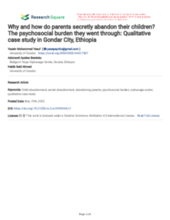Abstract:
Purpose:
Globally, studies on parents who secretly abandoned their children scarce and were unavailable in Ethiopia. This study, therefore, explored the lived experiences of mothers/fathers who secretly abandoned their children.
Methods:
Qualitative case study design was employed. Semi-structured interviews were conducted with purposefully selected parents in Gondar city. Thematic content analysis was employed to analyse the data.
Results:
In the present study, three core themes emerged: parents’ situation before delivery, parents’ child abandoning experiences, and parents’ psychosocial conditions after abandonment. Contextual factors before and after the child is born (e.g. challenging life situation, unwanted pregnancy, rape/abuse, etc.) played important roles in later child abandonment. Child abandonment is a process that includes contemplation, preparations and taking actions. Economic hardships, exacerbated by sociocultural factors pushed parents to abandon their children. Psychological sufferings begin before abandonment and continued after the abandonment.
Conclusions:
Child abandonment, as one form of avoiding parental responsibilities, is not a onetime act and sociocultural factors exacerbated the economic push factors. Therefore, it is recommended that extensive participatory studies, psychosocial support for vulnerable parents, and awareness creation campaigns need to be in place to mitigate child abandonment.

